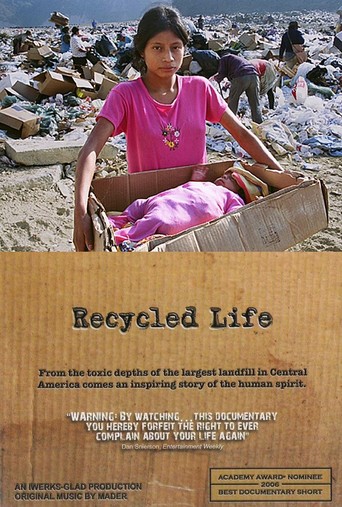recarsch
"Recycled Life" tells the heart-wrenching reality of several generations of lives lived in Guatemala City's municipal dump. Beautiful cinematography combined with a thought-provoking script makes for a stunning short documentary.Producer Glad and his associates have spent more than three years making the film. One of the film's "stars," Hanley, was killed in a car accident after the project wrapped and just days before the film was nominated for the Academy Award.If ever a film deserved an Academy Award - this is it -I hope it wins tonight!
camerado
Would be interested to see how things changed in 2006, over ten years later when this movie was made. They also have a pretty huge dump here in Phnom Penh where I now live and work...somehow, these developing nation dumps on the outskirts of town are great places for NGOs and filmmakers to capture the grim pathos of the folks living there, yet not so far away from town that, after shooting, you can head back for a Latte and a nice thick, juicy steak. Anyway, it'll be interesting to see how this doc portrays dump dwellers. So let's see, now I have to write a few more lines to meet the quota? Well, uh, what was the Guatemala dump like back in 1995 when we were shooting there? Lots of glue sniffers, old broken Michel Jackson records. Also many photographers, NGO folks, filmmakers hanging around at times, since the dump is a perfect, "blue chip-" backdrop to portray the lives of the downtrodden, and great for PR purposes for local NGOs who need to raise some bucks. Anyway I cut our footage into a travel doc I did, shot it on Hi8 (these were pre-digital days).
rasecz
The main garbage dump of Guatemala City is situated in a sizeable ravine, one of the largest such dump in Central America. More than four thousand individuals -- men, women and children -- make a living by sorting through the many daily trash truck deliveries. Everything that has a potential value is scavenged. During the day, recyclers visit the dump and buy the sorted material -- plastics, glass, metals, etc. The dump economy is in large part driven by those exchanges. About a million pounds of waste is recycled every day.To save on commuting, many of the "guajeros" live on the grounds of the dump. Some are second generation "guajeros" having lived their whole life there. There are many children, often rejects from society. Such is the case of Carlos: his father died and the mother's new husband rejects her son; he now lives permanently at the dump.The Santa Clara Nursery opens. I guess funded by charity. Mothers that would normally dump their kids on some pile of trash with a broken toy to play with can now dump them at a civilized place that can educate. The prevalent illiteracy of those kids can now be reversed, we hope.The star "guajero" is Charlie de Leon. A fluent English speaker (is he American?), he shows us around. His shack is plush compared to the improvised cardboard shelters of others. Probably some of the furniture is discarded IKEA, but I could not tell. He even has an extra bed for eventual guests.Food is free. The trucks that deliver leftovers from restaurants and markets are recognized. You just have to get behind the truck before the black vultures that fly in for a meal. Hungry? Charlie claims to have found a lasagna still oven-warm. Someone else munches on half-eaten(?) muffins. Hey, Charlie, set the table for the leftovers from the Four Seasons. What I like most is that you don't have to tip.Fortunately film technology has yet to transmit odors. The stench of the dump will not bother you. Just pay attention to the nifty finds: Mish, a female cat that Charlie adopts (yes, people do dump their pets); sexy lingerie, a chance for poor women to wear Victoria's Secret; a gold(?) watch; an unopened gift that may contain a tie (did the guy break up with his girlfriend so soon after?); an American flag (unburnt I hasten to say); flower pots with flowers, a rare instance of beauty in this dismal landscape.The dump is not a safe place. Lots of trucks back into the dump to discharge their loads. Children and adults are sometimes ran over. Occasionally the ground gives and swallows people, their bodies sometimes recovered by rescue operations, sometimes not. Methane gas bubbles from the mounds of trash. Breathing of those vapors the cause of numerous cancers.On January 24th of 2005, the methane catches fire and the entire dump goes up in flame. Finally the authorities decide to do something. They institute a system of ID cards for approved "guajeros", children are no longer permitted in, there are opening and closing times for the newly installed access gates. Inconveniences for the "guajeros". They seem to prefer the freewheeling of yesteryears. But the worse is ahead. The dump has only two more years to go. The "guajeros" will have to move with the trash. At least they know that, as long as modern society functions, there is an inexhaustible source of trash. Their livelihood is assured.
